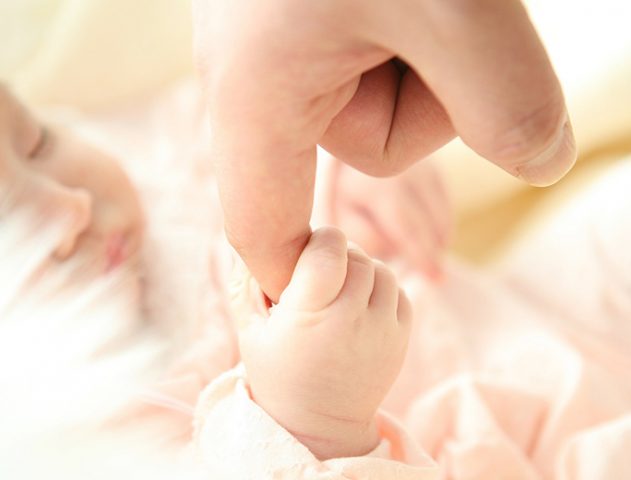R. Jared Staudt works in the Office of Evangelization and Family Life Ministries of the Archdiocese of Denver. He earned his BA and MA in Catholic Studies at the University of St. Thomas in St. Paul, MN and his PhD in Systematic Theology from Ave Maria University in Florida. Staudt served previously as a director of religious education in two parishes, taught at the Augustine Institute and the University of Mary, and served as co-editor of the theological journal Nova et Vetera. He and his wife Anne have six children and he is a Benedictine oblate
Science tells us when life begins. Reason dictates that human life has dignity and needs protection. Faith gives us inspiration and strength to share this with others.
 An article came out this last week on the complete absence of any pro-life candidates for the Democratic Party: “Abortion debate is over inside the Democratic Party.” The article features a Catholic candidate running in Pennsylvania, Conor Lamb, who describes his cliché personal opposition and public support for abortion:
An article came out this last week on the complete absence of any pro-life candidates for the Democratic Party: “Abortion debate is over inside the Democratic Party.” The article features a Catholic candidate running in Pennsylvania, Conor Lamb, who describes his cliché personal opposition and public support for abortion:
Lamb doesn’t make his support of abortion a big part of his campaign. A Roman Catholic, he says he personally opposes abortion. But he opposes the GOP-proposed 20-week ban on abortions and has seen his views come under attack during the special election. And in an interview, he emphasized that the country was founded on the principle of separating church and state. “To me, that means we defend the law as it is,” he said.
Now, what in the world does abortion have to with the separation of Church and State? And law does not automatically make a position right. The history of our country demonstrates that.
The line that opposition to abortion comes simply from faith has become common on both sides of the aisle. Although the personally opposed line has become standard for Catholic Democrats, even Republicans can take a similar line in their opposition to abortion. Jeb Bush, for instance, during the last presidential campaign, described his pro-life position in personal terms: “I got to act on my core beliefs. It’s part of who I am. Life is a gift from God” (Republican Primary Debate, Sept. 16, 2015). I agree with Bush 100% and he has done many things to support life (even if not always consistently), but describing opposition to abortion as a belief and appealing to God plays into attacks from the other side, who claim conservatives impose their faith on others.
Does our faith, and any genuine faith, teach that abortion is wrong? Absolutely. But does that make abortion a religious issue? It would be absurd to make that claim. Is theft a religious issue? Well, it’s prohibited by the seventh commandment. Is perjury a religious issue? It’s covered by the eighth! What about homicide? That’s the fifth commandment, but who in their right mind would make that a religious issue? It’s a matter of justice! If homicide is a crime without having to appeal to religious authority, then there is no need to do so when it comes to abortion.
Many politicians still use the tired line that we don’t know when life begins. This factored into the Roe v. Wade decision itself. After reflecting on the Hippocratic Oath, Catholic Canon Law and theology, and the history of legislation in the U.S., among other things, the majority opinion essentially punted on this question:
Texas urges that, apart from the 14th Amendment, life begins at conception and is present throughout pregnancy, and that, therefore, the State has a compelling interest in protecting that life from and after conception. We need not resolve the difficult question of when life begins. When those trained in the respective disciplines of medicine, philosophy, and theology are unable to arrive at any consensus, the judiciary, at this point in the development of man’s knowledge, is not in a position to speculate as to the answer.
No speculation needed. We can now (and could have then as well) definitively answer this question from a solely scientific view. There is no question as to when a unique human being comes into existence: fertilization.
What should we say then of our opposition to abortion? Should politicians claim that their faith has nothing to do with the question of abortion or other moral issues? Paul Ryan had it right when debating Joe Biden. He did not deny his faith, but pointed out there are objective reasons for his position: “Now, you want to ask basically why I’m pro-life? It’s not simply because of my Catholic faith. That’s a factor, of course. But it’s also because of reason and science.” Biden responded that he refused to impose his faith on others, leaving out the reason and science part.
If we rely primarily on religious arguments against abortion, as well as for marriage and euthanasia, we will lose public support. I am by no means advocating that we hide our faith, but when we are discussing matters of clear justice and human dignity, we do not need to surrender points related to the common good, allowing the other side to claim we are imposing personal opinions and beliefs. Science tells us when life begins. Reason dictates that human life has dignity and needs protection. We should make arguments building upon these two points. Our faith confirms these facts and gives us inspiration and strength to share the truth in a convincing way with others.
______________







